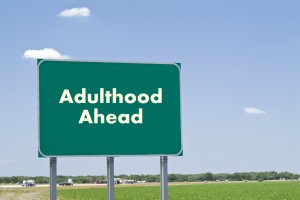
In order to aid adolescents during the maturation process, we must have an idea of what being an adult is all about. Adulthood is something that is hard to define. Humans do not step over a line of maturation that instantly makes them an adult. Maturation is a gradual process, and leaves many individuals at various ages asking the question, “Am I there, yet?” Sharon Parks describes the difficulty in defining what it means to become an adult.
When does one cross the threshold into adulthood? The response of North American culture is ambiguous. Chronological age does not serve as a consistent indicator, and the rites of passage that might mark the threshold of adulthood are various. (Parks)
While defining adulthood might be a difficult or almost impossible process, there is much to be learned during the journey.
There was a time in American culture when people understood what it meant to become an adult. According to Settersten, “For many decades, scholars held that five transition markers delineated entry into adulthood: completing school, leaving home, beginning one’s career, marrying, and becoming a parent” (Settersten). However, concrete events are not sufficient as transition milestones, since some of those events (like marriage and having children) may not be experienced by all people I believe that demographic markers of adulthood (age, education, marriage, parenting), should be minimized, and will instead establish three developmental tasks as markers of adulthood.
 Because human development is not truly filled with distinct stages, but rather is a continuum of development, it is more profitable to see adulthood as a set of developmental tasks. Each life phase is marked by a set of tasks that when completed signify moving from one life phase into another. But even these criteria do not serve as definitive boundaries because an individual later may regress back to old behaviors.
Because human development is not truly filled with distinct stages, but rather is a continuum of development, it is more profitable to see adulthood as a set of developmental tasks. Each life phase is marked by a set of tasks that when completed signify moving from one life phase into another. But even these criteria do not serve as definitive boundaries because an individual later may regress back to old behaviors.
Due to changes in our culture, “contemporary American youth now rely on individualist criteria to the exclusion of demographic transition markers (Settersten). While diversity among the maturation processes of young adults is normal and should be celebrated, adulthood is not defined by the individual. I believe that there are still some general markers that can be established by our culture that are helpful for the individual and our culture. I believe the three major tasks of adulthood are to establish autonomy, develop community, and discover vocation. If the individual becomes competent in these tasks, they are able to function as an adult within society.
Edward Deci and Richard Ryan are professors in the psychology department at the University of Rochester who developed the self-determination theory. They have proposed that humans have three basic needs: competence, autonomy, and relatedness. These three basic needs require “innate psychological nutriments that are essential for ongoing psychological growth, integrity, and well-being” (Deci and Ryan). They further claim that, “each of these three needs plays a necessary part in optimal development so that none can be thwarted or neglected without significant negative consequences” (Deci and Ryan). The three needs established by Deci and Ryan coordinate with the three major tasks of adulthood (where as competence is the equivalent of vocation, and relatedness is the equivalent of community).
Jeffrey Arnett also lists the three criteria for becoming an adult as accepting responsibility for yourself, making independent decisions, and becoming financially independent (Arnett). While similar to Arnett’s criteria (where as accepting responsibility and making independent decisions is the equivalent of autonomy and financial independent is the equivalent of vocation), my tasks emphasize the importance of community rather than the rampant individualization of the Western world.
At EA Resources, we believe the three major tasks of adulthood are to establish autonomy, develop community, and discover vocation. If the individual becomes competent in these tasks, they are able to function as an adult within society. For a deeper discussion of each task, please click on the corresponding link, or search the tags – autonomy, community, and vocation.
Resources
Arnett, Jeffrey. Emerging adulthood: The winding road from the late teens through the twenties.
Deci, Edward and Richard Flaste. Why we do what we do.
Parks, Sharon. Big Questions, Worthy Dreams: Mentoring Young Adults in Their Search for Meaning, Purpose, and Faith.
Settersten, Richard A. On the Frontier of Adulthood.





